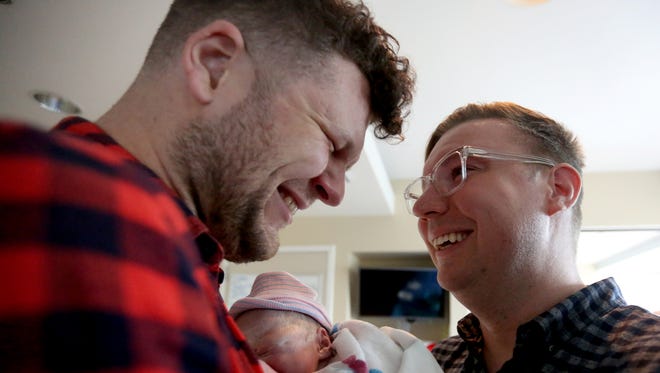Reason for infertility: 'We don’t have a uterus, we need to find friends who do'

Dan Neville-Rehbehn was sitting with his husband at a fertility center and filling out a questionnaire for in vitro fertilization when he came to the question: What’s your reason for infertility?
“His answer was 'gay,'” his husband, Will Neville-Rehbehn, said.
Will Neville-Rehbehn said Dan’s answer summed up just how complicated their situation was.
“We don’t have a uterus. We need to find friends who do, and sitting in a lot of waiting rooms at a lot of IVF clinics it is a stark reminder that most of the people who are there are there because their journeys have already been harder than ours has been,” Will Neville-Rehbehn said.
The couple recently had a child through gestational surrogacy, where an embryo is created using an egg donor and the sperm from the couple. While they recognize they’ve had it easy compared to some women’s struggles with infertility, it has in no way been a smooth journey. There is a complex web of state surrogacy laws making it illegal to use a paid surrogate in some states, like New York, where the couple live, and legal in other states, like California. To turn their dream of becoming fathers into a reality, the couple spent tens of thousands of dollars on in-vitro fertilization, a surrogate agency, surrogate fees, lawyers, and travel and medical costs.
“The thing we didn’t know going into this was surrogacy is hard not only financially and in terms of a ton of complicated science and a hell of a lot of human compassion and generosity, but it’s a patchwork of laws just trying to make it impossible,” Will said.

The Neville-Rehbehns were matched with a surrogate in 2015 several months after reaching out to All Families Surrogacy in Oregon, an agency that has 10 staff members, many of whom were surrogates themselves.
Carey Flamer-Powell, founder and director of All Families Surrogacy, said her agency's screening process of surrogates, who must have given birth before, can take up to four months. She said the hardest part is getting the potential surrogate's medical records approved to carry another pregnancy, because doctors want to ensure that the pregnancy is not risky.
Flamer-Powell said her agency also sends a social worker to the potential surrogate's home to ensure that the woman lives in a healthy situation and her children are well taken care of.
"It takes lots of time and money, and so many hopes and dreams are invested in this person that there can't be any issues whatsoever," Flamer-Powell said.
After surrogates are vetted, they are matched with potential couples based on whether their personality and expectations are in line with the potential parents'. In Will and Dan's case, they Skyped with Yessenia Jones, a mother of two, and her husband, Alex.
"It just felt like, 'Oh, these are two people who are supposed to be in our lives,'" Will said. "It felt like meeting friends." and a huge sigh of relief it wasn’t hard or difficult to talk to them even though the conversations were about really serious difficult things."
Within a few weeks of matching, the couple were texting and talking on the phone with Yessenia, and after the embryo was successfully implanted, they continued to Skype through doctor appointments and check-ins.
More coverage:
Making the match: How women become surrogates
What your sexuality, age and location have to do with your IVF coverage
Myths about IVF, surrogacy and adoption
For Yessenia, it was important to explain to her son that the baby she was carrying was not related to them.
“We never wanted him to think somebody was adopting the baby," she said. "This is very much their baby, it’s not related to Mommy it's not related to Daddy; the doctor put the baby in there for Mommy to cook it. That was the easiest way that you could explain it to a 5-year-old." for him to get it and be 'OK, I get it. And he is good with it.'”
She said many people wonder if it's hard for surrogates to give up the baby they carried for nine months, but she said that in reality it's harder to let go of the everyday contact with the parents and the friendship that develops.
"We have these friends we talk to every single day, and obviously that is going to change," she said. "That I think is more of the attachment than it is to the baby, the attachment is to the friendship we have created."

Yessenia gave birth to Will and Dan's son Jackson Strange Neville-Rehbehn on Oct. 24, 2016, in Oregon. Dan said they know Jackson will inevitably wonder who Yessenia is, what connection he has to her.
"(He) will come home and be like, “You know is Yessenia my mom?” and the answer is 'No, you don’t have a mom, you have two dads, and that’s really special," Dan said.
Will and Dan believe their child will have a relationship with Yessenia and her family because they have grown so close through the process.
"It’s very similar to how we felt about wanting, developing a friendship with Yessenia. It wasn’t something we went in looking for, but it developed naturally and organically," Dan said. "I think it will be the same with our kid and Yessenia, and that relationship will develop naturally over time."